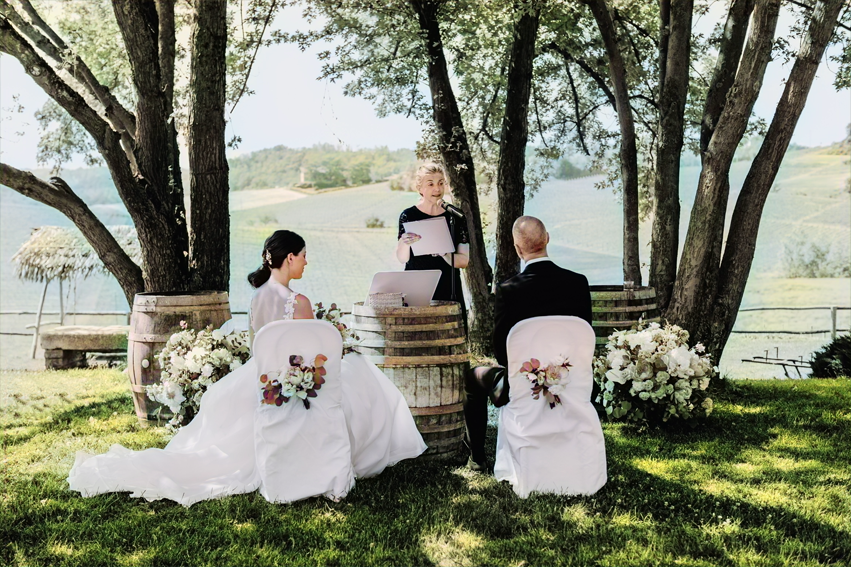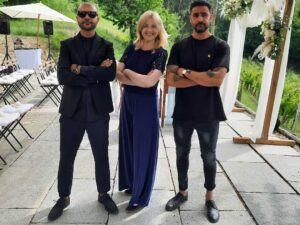Often when people talk about a “lay” wedding they immediately think of the concept of atheism, assuming that a “lay” wedding also corresponds to an “atheist” ceremony.
But is this really the case?
To shed light on these two concepts, let us start with their respective etymological analysis.
The term “layman” is derived from the ancient Greek laikós, meaning “of the people,” belonging to the secular and non-ecclesiastical people, thus lacking the theological-philosophical knowledge proper to the clerical caste.
The term “secular,” in modern usage, has the meaning of “nondenominational,” unconnected to any religious (or nonreligious) denomination.
In recent years, the term “secular” has been used loosely to refer to both an “agnostic” or “atheist” attitude; however, such usage is incorrect, because “secular” means untethered from denominational authority, but does not exclude the practice of a religious belief, so we can thus distinguish between “lay believers” and “lay non-believers.”
The term “atheist” is also derived from the ancient Greek word àtheos, that is, from the noun “god” with the a-privative in front, and literally means “godless”: an “atheist” is therefore someone who does not believe in any deity and denies its existence as a reality transcending man.
We see, therefore, that the terms “secularist” and “atheist” express two very different concepts and positions.
A secularist is also a person who is free of prejudice and who strives to reason from non-aprioristic assumptions, without becoming entrenched in crystallized and unchanging positions.
A secularist is someone who advocates for a clear and distinct separation between the life of institutions and the influence and interference of religious denominations (whatever they may be), and who hopes and works for a society that is not subservient to religious beliefs and prejudices.
It now appears with greater clarity how a “lay” marriage is a ceremony that is not necessarily “atheistic,” but one that focuses on the history and lives of the people it celebrates without making any reference to defined transcendent entities or a particular religious belief. However, this does not mean that the people involved cannot harbor a feeling of the transcendent within themselves.
Those who request a humanist lay wedding or other type of ceremony (and I like to add the adjective “humanist” precisely to emphasize the value that such a ceremony places on human beings as unique and complete in themselves) wish to place at the center of such a celebration their own life story and their own love story, or honor the memory of a loved one by recalling their words, deeds and actions performed in life, or celebrate a milestone in one’s life such as the arrival of a new family member (whether adopted or biological) or celebrate one’s coming-of-age.
For all these reasons, it is important to emphasize that a “lay” ceremony is not necessarily an “atheist” ceremony. There are a variety of reasons for having this kind of a ceremony: for example, couples who come from different countries, have different religions, and wish to celebrate their love in a way that is inclusive and does not discriminate against either party.
In my work as a humanist lay celebrant, I have celebrated so many unions that, although they displayed neither symbols nor the ritual of any religious belief, they were imbued with such an all-encompassing sense of beauty, spirituality, deep love and profound respect for one’s own essence and for the essence of one’s partner, that they offered the protagonists and all the people involved an experience of universal and extraordinary brotherhood and sisterhood.
After all, as the famous psychiatrist Carl Gustav Jung once observed, “the decisive question for the human being is: Am I related to something infinite or not?” […]
Our psyche is constructed
in harmony with the structure of the universe,
and what happens in the macrocosm
happens equally in the infinitesimal and more subjective recesses of the soul.”
And so, perhaps, choosing to celebrate our unique and special moments with a humanist lay ceremony is the most honest and inclusive way to celebrate our common humanity, because we are all part of the same community: humankind.




